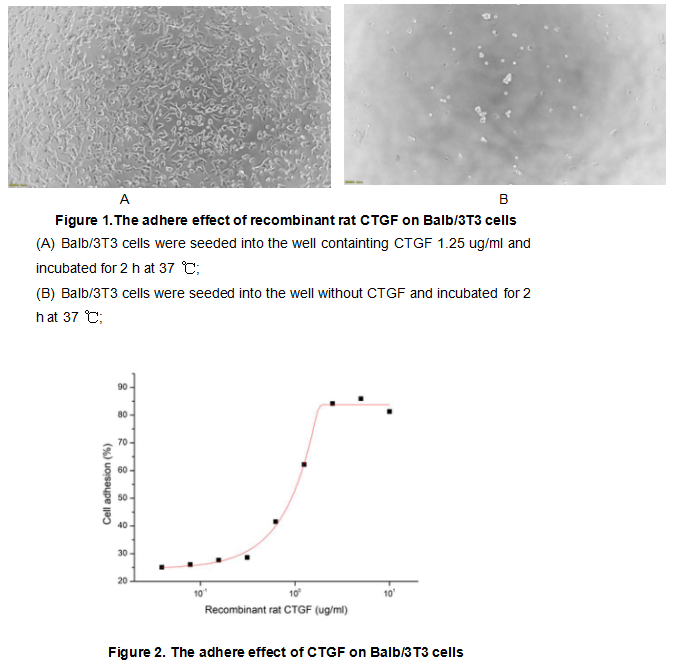Active Connective Tissue Growth Factor (CTGF)
CCN2; HCS24; IGFBP8; NOV2; Insulin-Like Growth Factor-Binding Protein 8; Hypertrophic Chondrocyte-Specific Protein 24; CCN Family Member 2
- Product No.UAPA010Ra01
- Organism SpeciesRattus norvegicus (Rat) Same name, Different species.
- Buffer FormulationPBS, pH7.4, containing 0.01% SKL, 5% Trehalose.
- TraitsFreeze-dried powder
- Purity> 90%
- Isoelectric Point8.2
- ApplicationsCell culture; Activity Assays.
- Download Instruction Manual
- UOM 10µg50µg 200µg 1mg 5mg
-
FOB
US$ 91
For more details, please contact local distributors!US$ 228
For more details, please contact local distributors! US$ 455
For more details, please contact local distributors! US$ 1365
For more details, please contact local distributors! US$ 3413
For more details, please contact local distributors!
ACTIVITY TEST of the Active Connective Tissue Growth Factor (CTGF)



Connective Tissue Growth Factor (CTGF), also known as CCN2 is a matricellular protein of the CCN family of extracellular matrix-associated heparin-binding proteins. CTGF has important roles in many biological processes, including cell adhesion, migration, proliferation, angiogenesis, skeletal development, and tissue wound repair, and is critically involved in fibrotic disease and several forms of cancers. As CTGF has the function of cell adhesion, we measure the activity of recombinant rat CTGF by the ability of the immobilized protein to support the adhesion of Balb/3T3 mouse embryonic fibroblast cell. When 5 x 104 cells/well are added to different concentrations of recombinat rat CTGF coated plates, cells will adhere after 2 hour incubation at 37 ℃. The adhesion of Balb/3T3 after 2 hour incubation at 37 ℃ observed by inverted microscope was shown in Figure 1. Cell adherent was in a dose dependent manner, the result was shown in Figure 2, the EC50 was 1 ug/ml.
USAGE of the Active Connective Tissue Growth Factor (CTGF)
Reconstitute in 10mM PBS (pH7.4) to a concentration of 0.1-1.0 mg/mL. Do not vortex.
STORAGE of the Active Connective Tissue Growth Factor (CTGF)
Avoid repeated freeze/thaw cycles. Store at 2-8°C for one month. Aliquot and store at -80°C for 12 months.
STABILITY of the Active Connective Tissue Growth Factor (CTGF)
The thermal stability is described by the loss rate. The loss rate was determined by accelerated thermal degradation test, that is, incubate the protein at 37°C for 48h, and no obvious degradation and precipitation were observed. The loss rate is less than 5% within the expiration date under appropriate storage condition.
INCREMENT SERVICES
BCA Protein Quantification Kit
Molecular Mass Marker for Protein
Monoclonal Antibody Customized Service
Polyclonal Antibody Customized Service
Protein Activity Test Experiment Service
Electrophoretic Mobility Shift Assay (EMSA) Experiment Service
Buffer
Lentivirus Packaging Experiment Service
Adenovirus Packaging Experiment Service
Real Time PCR Experimental Service
Spike RBD Protein (S-RBD)
Protein G
Protein A



